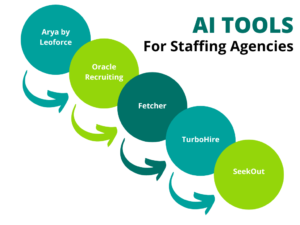
With technological advancements, changing work models, and evolving expectations of employees and employers, the industry is undergoing a big transformation. This article will discuss some of the top trends ruling the staffing industry.
Staffing Trend 1: Artificial Intelligence
The use of Artificial Intelligence (AI) has been on the rise in recent years and has impacted many industries, including staffing. AI-powered tools have been enhancing candidate screening and matching processes by analyzing extensive amounts of data, reducing time-to-hire while still finding quality employees.
In a survey conducted by Sense, 75% of respondents said they use free Generative AI tools or comprehensive AI-powered platforms. Staffing agencies can use Artificial Intelligence to attract top talent, increase productivity and reduce time-to-fill, and analyze how to better serve clients.

Staffing Trend 2: Growth of Remote and Hybrid Work Models
Since the COVID-19 pandemic of 2020, the world has shifted its work models from strictly in-person to remote/hybrid models. Remote models allow flexibility and work-life balance, which makes it a top choice for employers and employees. Hybrid models combine the benefits of working remotely with the benefits of being in-person, allowing the employee or employer to have versatility. Remote work will continuously rise, which could impact staffing agencies.
Staffing Trend 3: Demand for Skilled/Specialized Talent
The demand for specialized skills is growing for industries such as IT, healthcare, and engineering (these industries need niche talents that are usually scarce). The staffing industry is solving this problem by focusing on recruiting and placing candidates with specific skill sets. Continuous learning and professional development is important for staffing agencies to stay relevant as times change.
Staffing Trend 4: Gig Economy and Freelance Work
The gig economy has continued to grow over the past few years. A gig economy is a labor market where people work on a temporary or freelance basis, rather than in permanent positions. It’s reshaping traditional staffing models as more people are seeking flexible work arrangements (ex: remote/hybrid, temporary positions instead of full-time). According to the Federal Reserve of Economic Data and the Bureau of Labor Statistics, in August 2024, there were 2,694 people within the temporary employee field. Staffing agencies have adapted well, connecting businesses with skilled freelancers.
Staffing Trend 5: Integration of Social Media in Recruitment
Social media is a behemoth industry itself, but it is useful for staffing industries to utilize. Social media platforms (Facebook, Instagram, LinkedIn, etc.) are powerful tools that can help take a staffing agency to the next level. Agencies can utilize the platforms to reach potential candidates by having an effective social media plan: posting engaging content, participating in industry groups, and using targeted advertising.
Staffing Trend 6: Emphasis on Diversity, Equity, and Inclusion (DEI)
Diversity, Equity, and Inclusion (DEI) has been on a steady rise, being integrated into modern workplaces. More and more companies have realized the importance of having diverse teams that help drive innovation and success. Implementing a DEI plan helps staffing agencies ensure fair hiring practices. Promoting diversity can lead to a broader range of perspectives and better problem-solving capabilities.



